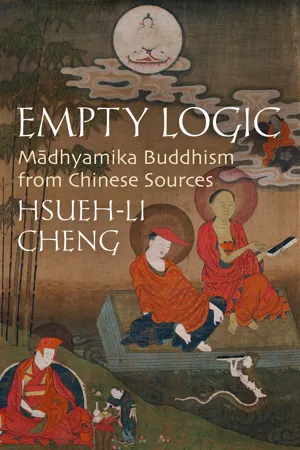
- 356 pages
- English
- ePUB (mobile friendly)
- Available on iOS & Android
eBook - ePub
About this book
"Covers the basic philosophy and arguments of
M?dhyamika
, as well as discussing its possible influence on other forms of Buddhist thought, including Zen."
—
Journal of Chinese Philosophy
The chief purpose of Empty Logic is to expound the M?dhyamika philosophy of emptiness as presented in Chinese sources and to clarify misconceptions about this important Buddhist ideology. It is an attempt to present the earlier Chinese San-lun exposition of N?g?rjuna's thought. To followers of M?dhyamika, the doctrine of emptiness is not a metaphysical theory; rather it is essentially a way of salvation. Few people know that one of the most significant outcomes of N?g?rjuna's teaching was the creation of Zen (Ch'an) Buddhism in China.
In this work, Hsueh-li Cheng provides a general background of Buddhism to give a historical perspective of M?dhyamika thought and development. After exploring the various meanings and use of emptiness in the process of salvation and illustrating the relationship between M?dhyamika and Zen, Cheng investigates how M?dhyamikas addresses the concepts of reality, God, and knowledge. There follows a brief comparison between N?g?rjuna's, Kant's, and Wittgenstein's philosophies to suggest the unique nature of N?g?rjuna's teaching and explain why his beliefs cannot be classified alongside the other two thinkers.
Teaching emptiness as the middle way, the revolutionary M?dhyamika branch of Buddhism offers a singular and fascinating path to achieving liberation from the evil and suffering of the world.
The chief purpose of Empty Logic is to expound the M?dhyamika philosophy of emptiness as presented in Chinese sources and to clarify misconceptions about this important Buddhist ideology. It is an attempt to present the earlier Chinese San-lun exposition of N?g?rjuna's thought. To followers of M?dhyamika, the doctrine of emptiness is not a metaphysical theory; rather it is essentially a way of salvation. Few people know that one of the most significant outcomes of N?g?rjuna's teaching was the creation of Zen (Ch'an) Buddhism in China.
In this work, Hsueh-li Cheng provides a general background of Buddhism to give a historical perspective of M?dhyamika thought and development. After exploring the various meanings and use of emptiness in the process of salvation and illustrating the relationship between M?dhyamika and Zen, Cheng investigates how M?dhyamikas addresses the concepts of reality, God, and knowledge. There follows a brief comparison between N?g?rjuna's, Kant's, and Wittgenstein's philosophies to suggest the unique nature of N?g?rjuna's teaching and explain why his beliefs cannot be classified alongside the other two thinkers.
Teaching emptiness as the middle way, the revolutionary M?dhyamika branch of Buddhism offers a singular and fascinating path to achieving liberation from the evil and suffering of the world.
Frequently asked questions
Yes, you can cancel anytime from the Subscription tab in your account settings on the Perlego website. Your subscription will stay active until the end of your current billing period. Learn how to cancel your subscription.
At the moment all of our mobile-responsive ePub books are available to download via the app. Most of our PDFs are also available to download and we're working on making the final remaining ones downloadable now. Learn more here.
Perlego offers two plans: Essential and Complete
- Essential is ideal for learners and professionals who enjoy exploring a wide range of subjects. Access the Essential Library with 800,000+ trusted titles and best-sellers across business, personal growth, and the humanities. Includes unlimited reading time and Standard Read Aloud voice.
- Complete: Perfect for advanced learners and researchers needing full, unrestricted access. Unlock 1.4M+ books across hundreds of subjects, including academic and specialized titles. The Complete Plan also includes advanced features like Premium Read Aloud and Research Assistant.
We are an online textbook subscription service, where you can get access to an entire online library for less than the price of a single book per month. With over 1 million books across 1000+ topics, we’ve got you covered! Learn more here.
Look out for the read-aloud symbol on your next book to see if you can listen to it. The read-aloud tool reads text aloud for you, highlighting the text as it is being read. You can pause it, speed it up and slow it down. Learn more here.
Yes! You can use the Perlego app on both iOS or Android devices to read anytime, anywhere — even offline. Perfect for commutes or when you’re on the go.
Please note we cannot support devices running on iOS 13 and Android 7 or earlier. Learn more about using the app.
Please note we cannot support devices running on iOS 13 and Android 7 or earlier. Learn more about using the app.
Yes, you can access Empty Logic by Hsueh-li Cheng in PDF and/or ePUB format, as well as other popular books in Philosophy & Eastern Philosophy. We have over one million books available in our catalogue for you to explore.
Information
Topic
PhilosophySubtopic
Eastern PhilosophyTable of contents
- Cover
- Title Page
- Dedication
- Contents
- Preface
- Chapter One General Introduction
- Chapter Two Principle Mādhyamika Doctrines
- Chapter Three Mādhyamika and Zen
- Chapter Four The Mādhyamika Treatment of Philosophical Issues
- Chapter Five Nāgārjuna, Kant and Wittgenstein
- Notes
- List of Chinese Terms
- Glossary
- Selected Bibliography
- Copyright